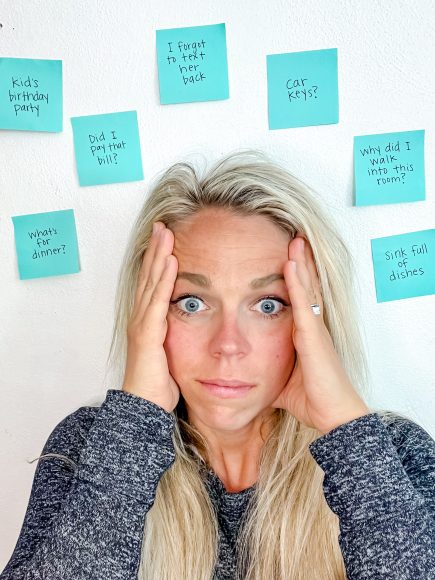What is it like to have ADHD as a mom?
- A million tabs open in your brain, but you. can rarely check things off your mental “to do” list.
- Feeling overwhelmed because you “can’t keep up”
- Read a paragraph several times to understand it because your mind was wandering.
- Start projects, but often have no motivation to finish them.
- Difficulty completing boring and mundane tasks, like routine housework.
- Emotionally charged and easily upset.
- Can get obsessed with a task/activity and get upset if you’re interrupted
I can find myself drowning in tasks to the point where minor hiccups in my routine can trigger feelings of doom and gloom. I can feel this internal pressure to go 100 different directions, but I only have 100 units of energy and I go … nowhere.
What is ADHD? [2]
ADHD: Attention-Deficit Hyperactivity Disorder
Before 1994, if you were diagnosed, it may have been called ADD, but now, the technical diagnosis is ADHD.
BUT there are different categories:
- ADHD- hyperactive-impulsive
- ADHD- inattentive type
- Combination ADHD
WOMEN VS MEN
ADHD often manifests differently in females than in males. Here’s a mind-blowing article (or, at least it was for me) on the negative effects ADHD have on girls/women.
Don’t want to read the article? I pulled my favorite parts.
“Unlike boys, many of whom show hyperactivity, girls’ symptoms veer more toward inattentiveness and disorganization. Girls tend to develop ADHD later than boys. They frequently mask it in an attempt to conform to society’s expectation that they be on the ball and organized. And while some ADHD symptoms can become less intense for boys after they pass through puberty, for many girls, it gets worse.”
“ADHD is a chronic neurobiological disorder which affects the brain structurally and chemically, as well as the ways in which various parts of the brain communicate with one another. It is highly heritable.”
“Pressure to perform means many girls internalize their symptoms—disorganization or carelessness—as personal flaws rather than medical issues to be treated through medicine and therapy.
Girls with ADHD are significantly more likely to experience major depression, anxiety, and eating disorders than girls without. “They tend to have few friendships,” Littman says. “As a result of their low self-esteem, they often choose unhealthy relationships in which they may accept punitive criticism and or abuse.”
Signs of ADHD in Women[1]
-trouble making decisions
–procrastinating and rushing to complete tasks at the last minute
-struggles with following directions
-makes careless mistakes
-easily distracted
-disorganized or messy
-forgets routine tasks, like household chores
-talking excessively
-interrupt people
-daydreaming
-trouble keeping on one topic
-missing deadlines
-restlessness & fidgety
-trouble maintaining friendships/relationships
-frequently misplacing or losing things (phone, keys, purse)
-hearing what people say but often have a hard time comprehending it
-forgetting people’s names, dates, events
-chronic overthinking (internal hyperactivity)
-frequently struggling to start and complete tasks
If you’re feeling this way (or have been diagnosed), you are not alone. I see you. I am you.
Like many females, I did not get diagnosed until adulthood- my mid-20s.
After being told by my boyfriend (now husband) who was diagnosed with ADHD as a child that he suspected I had some signs, I googled something along the lines of “signs of ADHD in women.” I was floored to find the article description describing my life story. Imagine that, some of the greatest hurdles you attack everyday … listed. I realized I’m not the only one. There are others like me. Also, why did I not know this sooner? Why is no one talking about this?
I made an appointment with my primary care doctor and she referred me for formal testing. The formal test consisted of a couple IQ tests and some kind of ADHD test- it was actually really fascinating!
The formal test came back that I had “severe ADHD” and the doctor said I probably went undiagnosed for so long due to my IQ, coping mechanisms, and home environment. Looking back, it makes sense. My reading comprehension scores were always way lower than my other testing scores- along with a slew of other tendencies I just thought were normal.
I was referred back to my primary care doctor for medication- tried a bunch that I didn’t like and finally found one that worked well for me. I had to go off medication three months prior to trying to get pregnant and had been off of it ever since … until this year.
An average day for me can be really difficult.
It’s hard to remember to not interrupt someone talking, stay focused on a conversation, focus on one task at a time, look people in the eyes when talking, not be fidgety when someone is talking, etc. I feel like I have 20 million tabs open in my head. All. The. Time. I can get obsessive with projects and get short with my kids when they interrupt me.
I started taking a small dose of medication again this year after feeling overwhelmed and mental burnt out in the layers of my life: mom, wife, business owner, growing a business, personal trainer, laundry, daily tasks, etc.
I struggled with the decision to go back on medication for a while as I wanted my coping mechanisms to WORK like that had before. But, as the psychiatrist who ran my testing years prior told me, as I added layers to my life, it would be harder for my coping mechanisms to be enough.
Medication doesn’t make my brain “fixed.” For me, it quiets the background noise and takes the static produced from feeling like I need to do all the things simultaneously to just one, simple focused priority I consciously choose. No day is perfect, but any thought stream is a lot less like herding kittens and more like calling soldiers into action.
I had the opportunity to chat with other moms who have been diagnosed with ADHD. Some of these women were diagnosed as children, others not until they were adults. They were so gracious to share their struggles, coping mechanisms, superpowers, daily routines, and ADHD hacks … stay tuned for PART 2 where I dive into managing ADHD in motherhood and life.
Xo,
Katy
SOURCES:
- Antoniou E, Rigas N, Orovou E, Papatrechas A, Sarella A. ADHD symptoms in females of childhood, adolescent, reproductive and menopause period. Mater Sociomed. 2021 Jun;33(2):114–8. doi:10.5455/msm.2021.33.114-118
American Psychiatric Association. What is ADHD?












Great post Katy! Thank you for writing this, I feel like I could have written it as my own story. I was diagnosed last year (age 38 🫣) and the phrase “but any thought stream is a lot less like herding kittens and more like calling soldiers into action” resonates so much with me! You put exactly into words how my brain feels ever. Single. DAY! I’m pumped to read Part 2! Thank you for sharing!
Comments are closed.